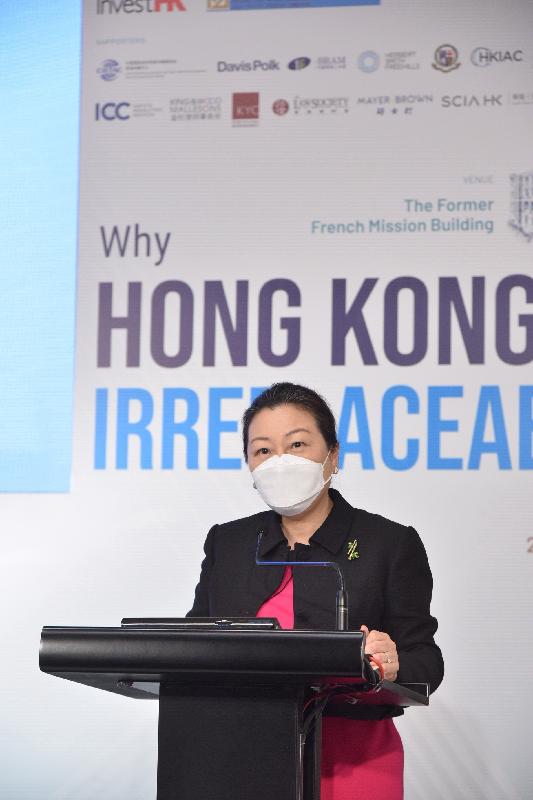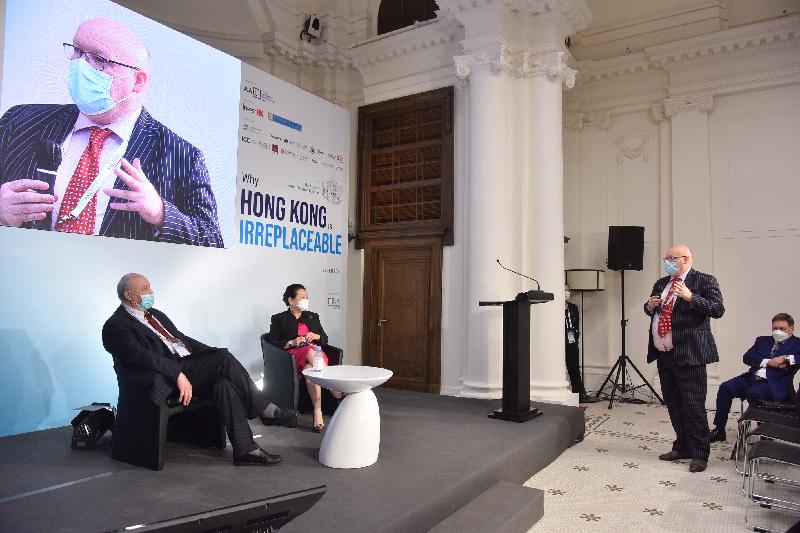Speech by SJ at webinar "Why Hong Kong is Irreplaceable" (English only) (with photos)
*************************************************************************************
Ladies and gentlemen,
As a prime venue for providing international legal and dispute resolution services, Hong Kong prides itself as having a solid foundation for the rule of law backed by an independent judiciary and an international and experienced legal community.
In 2019, in the midst of the street violence, concerns have been expressed over Hong Kong's status as a legal and financial centre. A seminar entitled "Is Hong Kong still irreplaceable?" was held in November 2019 in Beijing to facilitate exchanges between Hong Kong legal professionals and businesses. After frank exchanges, the participants reached a consensus that "Hong Kong is still irreplaceable".
Recently a media report suggested concerns about using Hong Kong as a deal-making and dispute resolution platform. It reminds us that perhaps we have not been reporting on the strengths and the development of Hong Kong enough. I am most grateful to the Asian Academy of International Law (AAIL) for organising timeously this webinar and put together international legal talents based in Hong Kong, people on the ground so to say, sharing experience about our legal services. I understand that there are nearly 1 000 people who have registered from some 58 jurisdictions providing a truly international audience. I also understand that there will be a "Why Hong Kong" series in the next few months so that any unjustified concerns will be clarified and the strengths of Hong Kong reinforced.
You have heard Mr Eddie Yue, the Chief Executive of HKMA (Hong Kong Monetary Authority), who talked about Hong Kong's franchise as an international financial centre. You have heard our legal talents, from the perspectives of deal-making and dispute resolution, the business opportunities and the legal services here. The experiences shared are fact-based and I hope that they will enable you to form a fair and objective opinion about Hong Kong.
The fundamentals of Hong Kong have let us withstand and rise above the challenges that we have been facing in the past two years. The cornerstone of our society is the rule of law. The infrastructure that one looks at is not only confined to the legal infrastructure but that of the society as a whole. First let me give you some recent facts and figures about the fundamentals in the financial sector:
a) From 2009 to 2019 Hong Kong came first in Initial Public Offering fund raised for seven years. Last year, Hong Kong ranked No. 2, just after NASDAQ, raising some US$51 billion, which is an increase of over 25 per cent from 2019.
b) We have the world's deepest Renminbi (RMB) liquidity pool outside Mainland China of over RMB600 billion, supporting the vibrant offshore RMB business. Around 70 per cent of the world's RMB payments are settled through Hong Kong, according to the latest SWIFT statistics.
The legal infrastructure is of course the focus today. The common law system in Hong Kong is well tested, open and transparent, rule-based, and independent. The independence of our judiciary is evidenced by the solid infrastructure that has been laid down primarily in the Basic Law - the security of tenure, the immunity of judges, the non-revolving door (that is one cannot go back to private practice after joining the bench), and importantly, the expressed provision in Article 85 of the Basic Law that guarantees judicial independence, free from any interference. The reasoned judgments made publicly available inevitably set out the legal and factual bases upon which the conclusions were drawn. The strong and independent legal fraternity in Hong Kong comprising of barristers and solicitors ensure that the rule of law is observed and respected. There are also 85 foreign law firms with 1 529 registered foreign lawyers here practicing in Hong Kong. The common law system has 150 years of history here and abundant case law has been developed providing for a business-friendly, certain and predictable legal framework for the international business community. The common law is well adapted to commercial transactions and Hong Kong law provides a very good option as the applicable law for commercial and investment transactions. With the vibrancy of the capital market, Hong Kong has the attributes to serve as an ideal venue for deal-making.
Commercial disputes are invariably resolved by way of arbitration or mediation nowadays. Hong Kong has adopted the United Nations Commission on International Trade Law (UNCITRAL) Model Law on International Commercial Arbitration as our arbitration laws; there is no restriction on the choice of arbitrators; parties are free to use lawyers from their own jurisdiction to represent them; awards are generally upheld by local courts and enforced in other jurisdictions, including the Mainland, ensuring finality and enforceability of Hong Kong awards; third party funding is permissible; there is no issue on arbitrability of intellectual property disputes. You may think that is true of most arbitration friendly jurisdictions. In that case, I turn now to something that is unique to Hong Kong.
Under the "one country, two systems" policy, a game-changing arrangement was made between Hong Kong and the Mainland in 2019. Parties to arbitral proceedings which are seated in Hong Kong and administered by one of the six arbitral institutions are able to seek assistance from the relevant court in the Mainland to obtain interim measures. HKIAC (Hong Kong International Arbitration Centre), for instance, has received applications to preserve assets totalling US$1.9 billion and Mainland courts have granted orders totalling US$1.5 billion. Hong Kong is the only jurisdiction outside the Mainland that can provide this service.
Another feature unique to Hong Kong is the opportunities under the Belt and Road Initiative and in the Greater Bay Area. Take the Greater Bay Area as an example. First, Hong Kong enterprises registered in Qianhai Shenzhen can now choose Hong Kong law as the applicable law for their contracts. Secondly, Hong Kong lawyers can take a special exam and be qualified as a PRC legal practitioner in the Greater Bay Area. This means businesses will be able to secure a lawyer in Hong Kong that is qualified to advise on both Hong Kong and PRC law in commercial and investment transactions within the Greater Bay Area. Only Hong Kong lawyers can benefit from this special arrangement.
These are made possible by reason of CEPA, the Mainland and Hong Kong Closer Economic Partnership Arrangement. Enterprises and individuals in service industries in Hong Kong can make use of preferential arrangements to carry out and expand business in most sectors in the Mainland. What I have highlighted is just the legal sector.
Further, under the CEPA, products of Hong Kong that fulfil the CEPA rules of origin can enjoy zero tariff treatment upon importation into the Mainland. Only products of Hong Kong enjoy this treatment.
Hong Kong investments and investors also enjoy investment protection and facilitation in the Mainland, such as simplification of formalities and requirements for investments. In 2017, the CEPA Investment Agreement has been concluded between Hong Kong and the Mainland providing for substantive protections for investments from Hong Kong.
The CEPA Investment Agreement provides for the use of mediation as the dispute resolution mechanism. Investment mediation is an area that Hong Kong is putting a lot in to develop, working with AAIL and the UNCITRAL Working Group III in particular. We believe that much can be said about the use of mediation in resolving investment disputes as long term relationships are at stake and future opportunities can be leveraged to settle amicably. We also see great need for Lawtech and in particular the promotion of using ODR (online dispute resolution) to complement arbitration and mediation as an affordable and efficient mechanism especially for SMSEs (small and medium-sized enterprises). You have heard Thomas (Chairman of eBRAM, Dr Thomas So) and the panelists just now talking about eBRAM's plans.
Returning to CEPA, Hong Kong's businesses enjoy the most preferential treatment and most favourable conditions for development in the Mainland, in particular in the Greater Bay Area. With legal and other consultancy services that can be provided, businesses using Hong Kong as a platform may well indeed get the best of both worlds.
What about competition, the rising of other financial or legal or arbitration centres around Hong Kong? We in Hong Kong welcome and embrace competition. Fair and clean competition always results in improvements. It ensures that we are not complacent and continue to explore and look for areas to innovate, develop and improve.
It is an objective truth that the business activities in Asia have grown and will continue to grow. Looking at the Greater Bay Area for instance, in 2019, the GDP is USD1,679.3 billion with a 4.4 per cent real GDP growth. As Eddie said, talents always follow the money. Where there are business opportunities, legal and dispute resolution services will thrive. And naturally more legal services centres will be developed in Asia. Yet, there are certain intrinsic strengths, opportunities and attributes that are unique to Hong Kong. Businesses will see for themselves where lies the greatest opportunities and find a geographic location that has the necessary infrastructure, services and talents that will best serve their interests.
I hope that you have enough objective facts and data for you to form a fair and rational opinion about Hong Kong and I leave you to draw, what I hope is the inescapable conclusion, that Hong Kong is irreplaceable. Thank you very much.
Ends/Friday, February 26, 2021
Issued at HKT 21:13
Issued at HKT 21:13
NNNN




